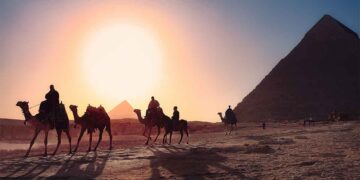Napoleon Bonaparte has been a source of fascination for Hollywood for almost as long as movies have existed. The latest actor to take on the role is Joaquin Phoenix in Ridley Scott’s film “Napoleon,” set to be released on Nov. 22. However, it’s important to note that the best Napoleon film is widely considered to be the 1927 silent movie “Napoléon”, directed and produced by cinematic pioneer Abel Gance.
Abel Gance had an ambitious vision for “Napoléon”; he originally planned for it to be a six-part epic depicting various aspects of Bonaparte’s life. However, he only completed part one, and that was enough to establish the film as a masterpiece. The six-hour movie follows the leader (played by Albert Dieudonné) from his early life through the French Revolution, ultimately culminating in his invasion of Italy in 1792. “Napoléon” was a technical breakthrough, introducing revolutionary techniques such as rapid-cutting, handheld cameras, and superimposition.
One of the most innovative aspects of Gance’s film was the invention of his Polyvision system. Similar to today’s IMAX technology, Polyvision utilized three cameras and three projectors to create a panoramic effect. After a few initial screenings in Europe, MGM purchased the film, but in 1929, they chose to cut it to about two hours and had a limited release in the United States. Unfortunately, “Napoléon” received a lukewarm response from audiences who were more captivated by the new talkies that were gaining popularity at the time. An attempt was made in 1935 to add a soundtrack to the film, but it ultimately failed to enhance the experience, and the effort was deemed unsuccessful.
Despite its initial reception, “Napoléon” eventually gained recognition for its cinematic excellence. In 1979, a five-hour restoration of the film premiered at the Telluride Film Festival, with the frail 89-year-old Gance in attendance. This moment marked a belated acknowledgment of Gance’s significant contribution to the world of cinema. “Napoléon” was finally celebrated as a towering achievement in film history.
Although Hollywood has continued to be captivated by the story of Napoleon Bonaparte, and numerous films have been made about his life and rise to power, Abel Gance’s “Napoléon” has remained the benchmark for cinematic portrayal of the historical figure. Its technical innovation, storytelling, and visual artistry have secured its place in the pantheon of great films.
The legacy of “Napoléon” continues to inspire filmmakers and cinephiles, reminding us of the power of visionary storytelling and the impact of groundbreaking filmmaking techniques. As Joaquin Phoenix prepares to bring his interpretation of Napoleon to the screen, it is worth revisiting and celebrating the influential and revolutionary work of Abel Gance’s “Napoléon.”































































